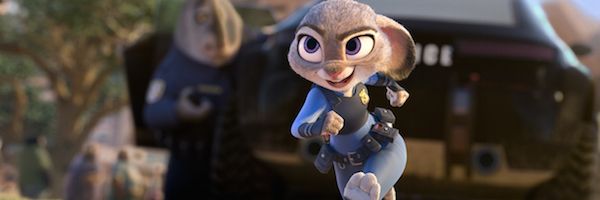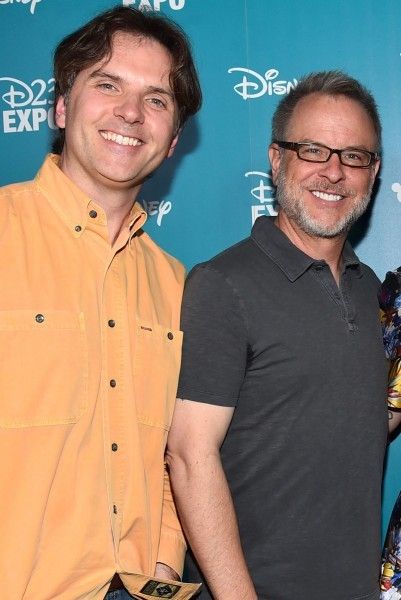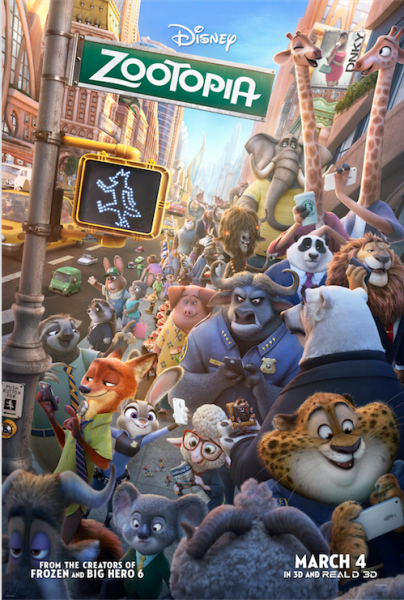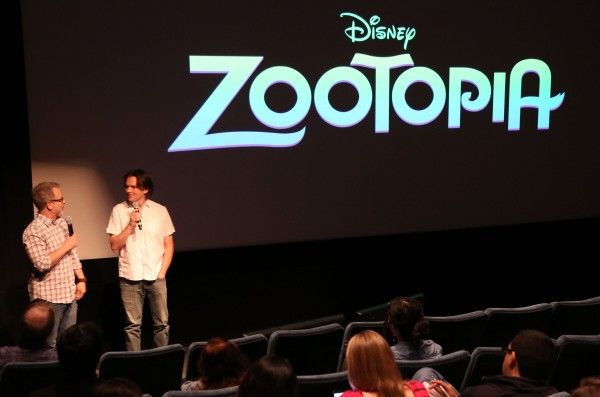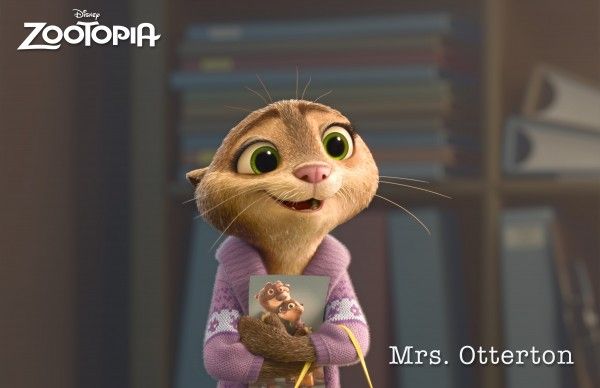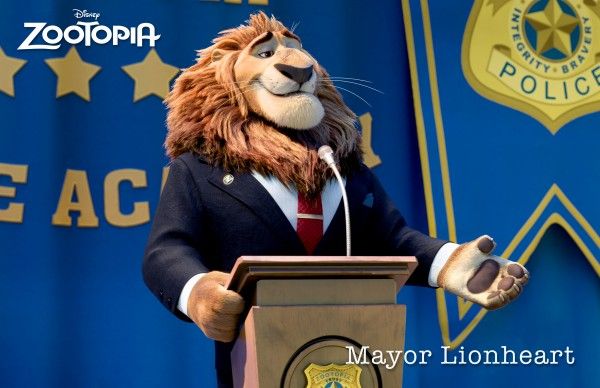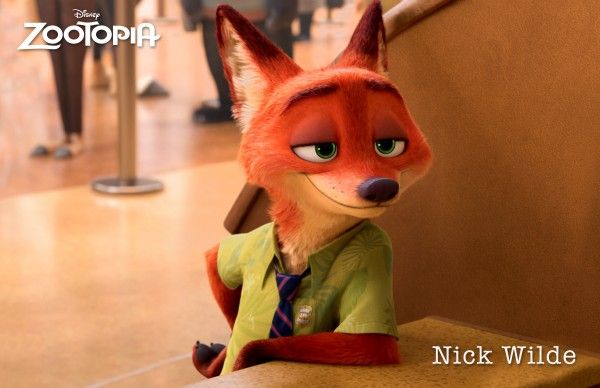Zootopia is a city like no other, comprised of habitat neighborhoods that are a melting pot where animals from every environment live together, and no matter who or what you are, you can be anything. But when optimistic Officer Judy Hopps (voiced by Ginnifer Goodwin) leaves her home and family and arrives in the big city, she discovers that being the first bunny on a police force of big, tough animals isn’t so easy. She’s determined to prove herself and crack a case, but she’ll have to partner with a fast-talking, scam-artist fox, named Nick Wilde (voiced by Jason Bateman), to do so.
In October, Collider (along with various other entertainment outlets) was invited to check out some scenes from the March 4th release and then chat with co-directors Byron Howard (Tangled, Bolt) and Rich Moore (Wreck-It Ralph). During this exclusive interview, they talked about the heart of the story they’re telling, why we live in a time where optimism is welcomed, getting story inspiration from Frank Capra films, making the decision to switch the story’s point of view from Nick to Judy and what that entailed, and that this world could easily support more stories.
Collider: For people who aren’t yet aware of Zootopia, what can you say about the heart of the story you’re telling?
BYRON HOWARD: Well, it’s an all-animal world where humans never existed. Animals in this movie are just like us. This world that we’re showing you is a completely new place, but you’ll find it very recognizable, if you look at it. One of the magical things about these anthropomorphic animal movies is that we can take things that are so common in our own world that we deal with, like the DMV, or moving to a new city, or our family, and show you a mirror image of those things, reflected in a whole new way. That’s why animals are great. We can take issues and things that are funny, tragic or challenging about our world and put them in a new framework.
RICH MOORE: It’s about a country bunny going to the big city to prove that she can be anything she wants to be, and she’s met with the opposing forces of a fox who believes we are what we are. It’s the conflict and the battle of those two philosophies, and we will see which one wins, by the end of the story.
Judy Hopps is a very optimistic character. Why did you want to center a story around a character that’s just looking to do good?
MOORE: We live in a time where optimism is welcomed. There’s enough hardship in life today that it’s refreshing to see these optimists on screen. I think what’s good about this movie, and other movies, is that we’re presenting optimists, but then making them prove what it is that they believe in. You see them suffer and work for their ideals, which I think is really cool. We’re not presenting an optimist that wants everything and gets it. Judy Hopps truly believes in something. We’re not just giving her the run of the story, where we give her everything. Through her actions, she has to prove what she believes in. Personally speaking, I think that’s cool. She’s an optimist, but yet, she’s flawed. She’s not a perfect character. She has flaws, just like any great protagonist.
HOWARD: We looked at a lot of Capra films, and we loved the fact that, in Mr. Smith Goes to Washington, Jimmy Stewart has got such a clear core belief of what Washington, America and life should be all about. That’s really challenging when he’s surrounded by cynical people, all around him, who are just pelting him with reality and saying, “No, it’s not this way, at all.” He falls apart toward the end of the film, and then he comes back even stronger. He grows and becomes a more aware, educated optimist. We talked about a character going from a blind optimist to someone who is an enlightened optimist.
I think that’s what great about Judy. She’s very powerful, she’s very strong and determined, and she’s very smart. Her naivete comes from where she was raised. Her family is very protective, and she’s coming from a very isolated situation. She has seen the city from afar and it’s become this idea for her, where she thinks that’s where dreams happen and that’s where people live and love, and that’s where art and music and goodness happen, and that’s where she can make a better place.
I felt like that. When I was up in Washington state, I always thought, “I’m going to go to Los Angeles where films are made and stories are told, and they’re going to love me and welcome me with open arms.” But, there was no welcoming committee. Everyone has felt like that. When you’re growing up, you have thoughts about what things are going to be like. College was very different from what I thought it was going to be, in the same way that Judy moving into the city was very different. What’s great about the movie is that you can really relate to Judy. I find bits of myself in Judy, and Rich [Moore] does, too. We see parts of ourselves in Nick, too. I do get down on the world sometimes and I’m like, “Yeah, he’s right.”
You originally had this story centered around Nick, and then you changed it to center it around Judy. How far into the process were you, when you made that change?
HOWARD: It was very far. We ripped the whole movie apart. It was pretty bad. That’s when Rich teamed up with us. Rich was very gracious and he put aside what he was working on, which was a movie that’s going to come out in a couple of years. We asked him if he could come on and team up with us, he was very gracious in coming on.
MOORE: It was one of those instances where there was a lot of work to be done and not much time to do it, so it became a two-man job. I had some history with the project, as part of the story trust, and just being there and being available, like we are with each other, so it wasn’t something brand new that I was coming into. I had helped these guys out before, when they were nice enough to come to myself and some other people for our opinions, so it was easy to jump on it. And it was a speeding train, at that point. Not only was it still being developed, but it was in production and large groups of people were starting to work on it.
And that wasn’t just a little change to make?
MOORE: It was huge. The whole point of view changed. It let us enjoy the city more. When we were learning about the city, for the first time, we were learning about it through the eyes of Nick, who’s a cynic. He felt oppressed by the city and he didn’t like Zootopia. Byron and the people who designed the city, from the outset, worked hard to create a world that we wanted the viewers to love and not feel like, “It looks cool, but Nick doesn’t like it, so should I not like it, too?” It was confusing. It was a lot to ask of the audience. And once it became Judy’s story, we could see it through the eyes of an optimist coming into the city, for the first time. We could enjoy it, and then feel burned by it a little bit when she has her first run-in. Nick became that first jaded Manhattanite that you run into, after a few weeks in New York, who suddenly takes the gleam off the Big Apple. There was still a lot of work to be done, but it felt like the spine of the movie was in line and that it was straight, at that point.
How did go about pairing up an actor with the animal that they’d be bringing to life? Were you worried that they’d wonder why you were picking them for that specific animal?
HOWARD: That was fun, actually.
MOORE: The people that we worked with so define their characters. They’re just the best of the best.
With such a big world and so many characters, does this story feel self-contained, or are audience going to immediately want to see more, either in future films or even in shorts?
MOORE: It doesn’t end totally open-ended, but the world is so well-designed and so big. It’s the stuff of imagination, and you want to know what’s going on over there, or on that side of town. It could easily support more stories.
HOWARD: And that would be great. As we’re creating a new world, it becomes a big playground for ourselves and for our co-workers. I would love to see it expand, just like I’d love to see Wreck-It Ralph expand. It’s nice to have that option to hear more about that place and these characters.
Zootopia opens in theaters on March 4th.

